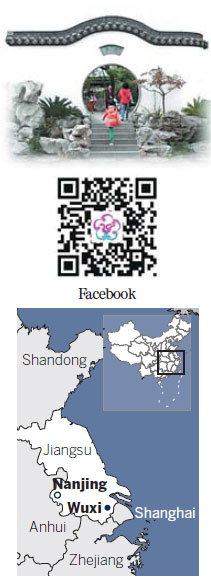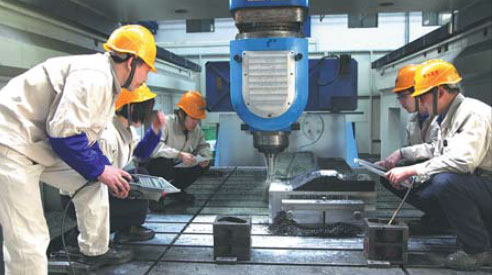Search This Supplers Products:steel pipeBossen steel tubeBossen steel plankBossen steel coilBossen scaffoldingBossen steel sheet
City banks on high-end manufacturing
sourceWebside
publisherMarks Liu
time2016/06/12
- City banks on high-end manufacturing
Faced with new challenges brought about by a slowing economy, Wuxi, Jiangsu province, is looking for new opportunities to boost the city's overall growth.
One major strategy is to develop its high-end manufacturing industry. Wuxi Turbine Blade, a State-owned enterprise founded in 1979, is one company leading the way with its development of engine turbines and aircraft parts.
Once a vital manufacturer of steam turbines in China, the company is currently a high-end engine parts supplier in the aviation and energy industries.
A production line at Wuxi Turbine Blade in Wuxi. Provided to China Daily |
Since 2008, the company has produced engine turbine blades for aircraft. In 2011, its new blade production line entered the China market with output exceeding 1 billion yuan ($151 million).
"In recent years, Wuxi Turbine Blade adjusted its development strategy to become a bigger player in the aviation industry. We have gained a lot of experience in the production of new materials and research of new technologies," said the company's manager Gu Linhua.
In 2012, the company achieved a breakthrough in the production of aviation engine blades and the 35,500-metric-ton screw press, part of a 2 billion yuan large blades manufacturing and forgings project.
Two other key areas in its transformation have been increasing its global competitiveness and developing its overseas aviation businesses.
In 2015, its overseas business reached $70 million in revenue, accounting for 43 percent of total revenue. That is a growth of 6 percent from the previous year.

Energy contracts comprised $60 million of its overseas business, with $10 million for aviation contracts.
Rolls-Royce, a global manufacturer of aviation engine parts, signed a 10-year contract with Wuxi Turbine Blade in 2015. Other clients include L&T, PSM, GE and Siemens. The company has also expanded its business to the Middle East.
The company said it wants its overseas businesses to drum up 50 percent of total company revenue by 2017.
Hyatech is another example of Wuxi's private enterprises steering toward high-end manufacturing.
The company manufactures aircraft engine compressor blades as well as artificial joints for medical orthopedic instruments using in-house machinery and production lines.
Established in 2013, Hyatech's technologies and know-how are among the most advanced in the industry, the company claimed.
In 2015, the company's R&D and production project to produce blisks, a major rotor disk and blade for aircraft, went into operation, marking a turning point for the city as it looks to transform into a high-end manufacturing hub, said Hyatech.
A blisk can make the engine lighter by 20 to 30 percent, with efficiency improved by 5 to 10 percent.
Yan Qi, chairman of the company, said overseas countries have already used the company's blisk technologies in component structural designs of military and civil aircraft.
"In China, the blisk's technology, from design, manufacturing and testing, is still at an early stage," Yan said. "But with China's advances in civilian planes, jet engines and gas turbines, the Asia-Pacific region is becoming a new center for the global aircraft industry," Yan said.
Hyatech said it plans to invest 40 million yuan in the second phase of the blisk project and introduce a number of machines and facilities.
The company aims to produce 300 blisks with different specifications by 2019 and to become an R&D and production platform for the aircraft industry.
Highlights
Smart manufacturing will be the main direction in the city's development of high-end manufacturing.
The city is also exploring sustainable development and implementing a more environmentally safe manufacturing industry. It is encouraging energy intensive industries, such as the steel, chemical, textiles and building materials sectors to improve their equipment, advance technological processes, and establish online platforms to monitor energy consumption.
Emissions of major industrial pollutants will drop by 10 percent by 2020, it said.

